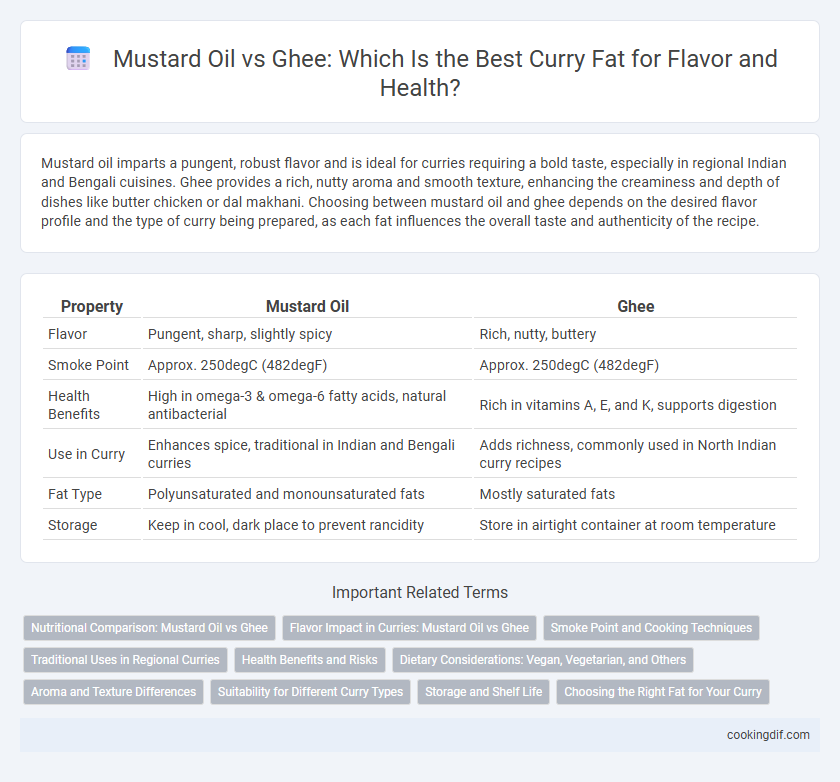Mustard oil imparts a pungent, robust flavor and is ideal for curries requiring a bold taste, especially in regional Indian and Bengali cuisines. Ghee provides a rich, nutty aroma and smooth texture, enhancing the creaminess and depth of dishes like butter chicken or dal makhani. Choosing between mustard oil and ghee depends on the desired flavor profile and the type of curry being prepared, as each fat influences the overall taste and authenticity of the recipe.
Table of Comparison
| Property | Mustard Oil | Ghee |
|---|---|---|
| Flavor | Pungent, sharp, slightly spicy | Rich, nutty, buttery |
| Smoke Point | Approx. 250degC (482degF) | Approx. 250degC (482degF) |
| Health Benefits | High in omega-3 & omega-6 fatty acids, natural antibacterial | Rich in vitamins A, E, and K, supports digestion |
| Use in Curry | Enhances spice, traditional in Indian and Bengali curries | Adds richness, commonly used in North Indian curry recipes |
| Fat Type | Polyunsaturated and monounsaturated fats | Mostly saturated fats |
| Storage | Keep in cool, dark place to prevent rancidity | Store in airtight container at room temperature |
Nutritional Comparison: Mustard Oil vs Ghee
Mustard oil is rich in monounsaturated and polyunsaturated fats, including omega-3 and omega-6 fatty acids, which support heart health and reduce inflammation. Ghee contains higher levels of saturated fats and fat-soluble vitamins like A, D, E, and K, offering energy-dense nutrition and aiding in vitamin absorption. Choosing mustard oil or ghee for curry impacts the dish's nutritional profile, balancing between healthy fats and rich, vitamin-enhanced calories.
Flavor Impact in Curries: Mustard Oil vs Ghee
Mustard oil imparts a pungent, sharp flavor with a hint of spice that enhances the depth of Indian curries, particularly in Bengali and Punjabi cuisines. Ghee offers a rich, nutty, and slightly sweet aroma that mellows spices and creates a creamy texture in dishes like butter chicken or dal tadka. The choice between mustard oil and ghee significantly alters the curry's flavor profile, balancing intensity and richness to suit regional preferences and dish types.
Smoke Point and Cooking Techniques
Mustard oil has a high smoke point of approximately 480degF (250degC), making it ideal for deep-frying or high-heat tempering in curry preparation. Ghee, with a smoke point around 450degF (232degC), provides a rich, nutty flavor while being suitable for sauteing and slow-cooking techniques. Choosing mustard oil or ghee depends on the desired cooking method and flavor profile, balancing heat tolerance and aromatic qualities in curry dishes.
Traditional Uses in Regional Curries
Mustard oil is traditionally favored in North Indian and Bengali curries for its pungent flavor and high smoking point, enhancing dishes like mustard fish and sarson ka saag. Ghee, a staple in South Indian and Punjabi cooking, imparts a rich, nutty aroma essential to dals, biryanis, and butter chicken. Both fats provide unique textures and flavors that define regional curry profiles and culinary heritage.
Health Benefits and Risks
Mustard oil contains heart-healthy omega-3 fatty acids and antioxidants, which may reduce inflammation and improve cardiovascular health when used in curry preparation. Ghee offers rich conjugated linoleic acid and fat-soluble vitamins A, D, E, and K that support digestion and immune function but is high in saturated fats, potentially increasing cholesterol levels if consumed excessively. Choosing between mustard oil and ghee depends on balancing cardiovascular benefits with saturated fat intake, considering personal health conditions and dietary preferences.
Dietary Considerations: Vegan, Vegetarian, and Others
Mustard oil serves as an ideal fat for curry preparation in vegan and vegetarian diets due to its plant-based origin and robust flavor profile. Ghee, derived from clarified butter, is suitable for vegetarians but excluded in vegan diets due to its animal source. Both fats offer distinct nutritional benefits; mustard oil provides omega-3 and omega-6 fatty acids, while ghee offers fat-soluble vitamins like A, D, E, and K, catering to diverse dietary preferences and health goals.
Aroma and Texture Differences
Mustard oil imparts a pungent, sharp aroma and a slightly grainy texture to curry, enhancing the dish's robust flavor profile. Ghee offers a rich, nutty aroma with a smooth, velvety texture that enriches the curry's mouthfeel. Choosing between mustard oil and ghee significantly influences the curry's sensory qualities, with mustard oil delivering boldness and ghee providing creamy depth.
Suitability for Different Curry Types
Mustard oil offers a pungent, sharp flavor that suits robust, spicy curries like Bengali fish or North Indian mustard-based dishes, enhancing their heat and depth. Ghee provides a rich, buttery aroma and smooth texture ideal for creamy, mild curries such as butter chicken or dal makhani, complementing delicate spices without overpowering. Choosing mustard oil or ghee depends on the curry's regional origin and desired flavor profile, with mustard oil better for bold, earthy curries and ghee preferred in creamy, aromatic preparations.
Storage and Shelf Life
Mustard oil has a longer shelf life than ghee, typically lasting up to a year when stored in a cool, dark place, making it ideal for curry fat that requires extended storage. Ghee, while rich in flavor, has a shorter shelf life of about 6 months and should be kept in an airtight container away from heat to prevent rancidity. Proper storage conditions significantly impact the preservation of both fats, influencing the taste and quality of curry dishes over time.
Choosing the Right Fat for Your Curry
Mustard oil imparts a pungent, sharp flavor and is favored in many regional Indian curries for its antioxidant properties and high smoke point, which enhances the dish's depth and aroma. Ghee, clarified butter, offers a rich, nutty taste and creamy texture that melts smoothly into curry, elevating its flavor profile while providing healthy fats and aiding digestion. Selecting between mustard oil and ghee depends on the desired taste intensity and nutritional benefits, with mustard oil suited for robust, spicy curries and ghee preferred for milder, richer preparations.
Mustard oil vs ghee for curry fat Infographic

 cookingdif.com
cookingdif.com